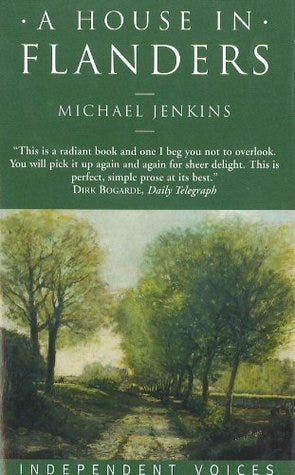A House in Flanders, by Michael Jenkins
This is a short book that makes you feel like you’ve had a long holiday. It is full of the plangent combination of nostalgia and humour that all great English memoirs share. It’s a coming of age story about a young boy who goes to stay with a group of old people who hover between wisdom and absurdity.
The world it belongs to is so remote (old crones in Flanders after the war) that the characters seem like they must be caricatures. But Michael Jenkins evokes this lost place with such carefully artless prose and neatly selected detail it is entirely realistic. Whatever exaggerations of memory exist, they don’t dent the reliability of the overall impression. That of course is a diplomat’s — as well as a writer’s — trick. To always say more than you mean by saying it less forcefully than everyone else.
Jenkins had a successful career in the Foreign Office, serving in Europe, Washington, and the Netherlands. (He had been a Russian interpreter during National Service, and a Cambridge Exhibitioner in languages.) After he retired he had a successful city career, wrote a biography of Aleksey Arakcheyev (a nineteenth century Russian statesman), and edited his aunt’s memoir.
His aunt was Elizabeth Jenkins, the novelist and biographer. And his father was the Byzantine scholar Romilly Jenkins. No wonder the young man in this book seems so quietly capable and well educated. He’d become adept at speaking French from his mother.
But this isn’t a memoir of his wonderful, capable relatives. It’s about his magical summer he spent living with his ‘aunts’ in Northern France. What a dream he makes it sound like. The tantes are a groups of sisters and brothers, and a few spouses and children, living in a big old family home in Flanders after the war. The link to his family is a secret, until we learn about a connection between Tante Yvonne and Jenkins’ grandfather (although the details are not clear about who this grandfather really was: the detail in the book doesn’t tally with any other information I have found.)
Everything about this world is fragile. The local arguments are intense — seen without the context and sympathy Jenkins give them, the material could easily have been turned to mockery. The whole thing has a Chekovian sense of crumbling dignity about it, like Oncle Augustine, who sneaks off from his gardening duties to drink absinthe and spew vitriol about Germany. One day he takes young Michael with him. They see a German couple in the square and Augustine (two absinthes in at this point) runs out, rat-a-tat-ing them with his walking stick. He ends up face down on the cobbles, and has to be taken home in the German couple’s Mercedes.
The situations of the book are exactly the sort of thing that illuminates a dying world to a young boy, or a forgotten one to later readers. Young people stuck in the twilight of the post war world. Old women using emotional blackmail to keep the Mayor in line. Hauntings, tragic stories, local women who are unreliable. And that staple of the genre, the wealthy woman in the big house who encourages the young boy to borrow books.
But none of this is absurd or petty. It’s a book of empathy. The whole thing is alive with the prospect of loss — the unthought of end of the holiday, the implied death of the tantes, the slow eclipse of their old way of living. This never comes to the fore until the end. The whole thing is a charming recreation of the long, magical summer, while Nostalgia tremors in the background.
The book would have been a charming introduction to a series. I’m desperate to read a memoir of Jenkins’ escapades at Cambridge, his time in Washington, his life in the City. Think of the anecdotes he must have have about his family (his father makes a brief cameo that promises well). I don’t even need it all to be completely true. I just want more of his clean, English prose and plain, English emotion. It’s like longing for the beef consommé from Wiltons. There are no substitutes.
When Michael Jenkins died, the obituaries said he had dictated a memoir to his daughter, Catherine Jenkins. It doesn’t seem to have been published. The manuscript must be lurking in an office somewhere. Surely there are sensible publishers out there — like the good burghers of Slightly Foxed — who would be willing to issue it now. I wish they would, especially if it comes with more of the lovely line drawings Catherine Jenkins drew for A House in Flanders.
A House in Flanders, Michael Jenkins (US link)
Thanks for reading. If you’re enjoying The Common Reader, let your interesting friends know what you think. Or leave a comment at the bottom.
If you don’t subscribe to The Common Reader, but you enjoy reading whatever’s interesting, whenever it was written, sign up now.


